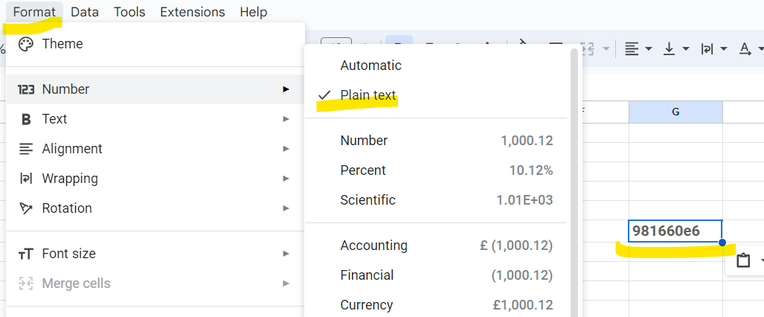- AppSheet
- AppSheet Forum
- AppSheet Q&A
- Re: ⚠️ AppSheet/Google Sheets recognized the ID as...
- Subscribe to RSS Feed
- Mark Topic as New
- Mark Topic as Read
- Float this Topic for Current User
- Bookmark
- Subscribe
- Mute
- Printer Friendly Page
- Mark as New
- Bookmark
- Subscribe
- Mute
- Subscribe to RSS Feed
- Permalink
- Report Inappropriate Content
- Mark as New
- Bookmark
- Subscribe
- Mute
- Subscribe to RSS Feed
- Permalink
- Report Inappropriate Content
I encountered a bug with one of my apps, and this might also affect yours, though the chances are very low due to the numerous combinations produced by using UNIQUEID().
Scenario:
The ID of the record in Table 1 is 981660e6. When I add or update a record in Table 1, it creates new rows in Table 2 through automation. However, when the automation finishes running, the app or Google Sheet returns 981660000000 instead of 981660e6 and will not return any child rows in the app
(This is the ID from Table 1)
(These are the rows added in Table 2)
- Mark as New
- Bookmark
- Subscribe
- Mute
- Subscribe to RSS Feed
- Permalink
- Report Inappropriate Content
- Mark as New
- Bookmark
- Subscribe
- Mute
- Subscribe to RSS Feed
- Permalink
- Report Inappropriate Content
Hi @JuneCorpuz ,
Thank you for reporting this.
One option to try is to make all the columns in G sheet back end as "Plain Text" type. I believe you may want to check if currently the columns could be set as "Automatic" in backend G Sheet =.
- Mark as New
- Bookmark
- Subscribe
- Mute
- Subscribe to RSS Feed
- Permalink
- Report Inappropriate Content
- Mark as New
- Bookmark
- Subscribe
- Mute
- Subscribe to RSS Feed
- Permalink
- Report Inappropriate Content
That’s what I did, but no luck
- Mark as New
- Bookmark
- Subscribe
- Mute
- Subscribe to RSS Feed
- Permalink
- Report Inappropriate Content
- Mark as New
- Bookmark
- Subscribe
- Mute
- Subscribe to RSS Feed
- Permalink
- Report Inappropriate Content
Oh okay.
- Mark as New
- Bookmark
- Subscribe
- Mute
- Subscribe to RSS Feed
- Permalink
- Report Inappropriate Content
- Mark as New
- Bookmark
- Subscribe
- Mute
- Subscribe to RSS Feed
- Permalink
- Report Inappropriate Content
Yes this is a known challenge but you can avoid this if you use something like "A"&UNIQUEID() with the initial value.
- Mark as New
- Bookmark
- Subscribe
- Mute
- Subscribe to RSS Feed
- Permalink
- Report Inappropriate Content
- Mark as New
- Bookmark
- Subscribe
- Mute
- Subscribe to RSS Feed
- Permalink
- Report Inappropriate Content
If you set the column type as plain text, then do a find and replace (981660000000 to 981660e6), does it fix the problem?
The problem is that google sheet's interpreted the scientific notation number and then wrote the actual number in the cell, literally changing the value in the field.
After you change the column type to "Plain Text" it won't do that anymore, but now you've got all the values currently in the sheet that are wrong.
- If you do a find & replace, after the column is set to Plain Text, I think this might solve the issue.
I was facing this before as well, and I believe this is what I had to do to fix things in the sheet so everything would work going forward.
- Mark as New
- Bookmark
- Subscribe
- Mute
- Subscribe to RSS Feed
- Permalink
- Report Inappropriate Content
- Mark as New
- Bookmark
- Subscribe
- Mute
- Subscribe to RSS Feed
- Permalink
- Report Inappropriate Content
I'll give this a try and I'll let you know. Thanks Matt!
-
Account
1,677 -
App Management
3,099 -
AppSheet
1 -
Automation
10,324 -
Bug
983 -
Data
9,676 -
Errors
5,733 -
Expressions
11,780 -
General Miscellaneous
1 -
Google Cloud Deploy
1 -
image and text
1 -
Integrations
1,610 -
Intelligence
578 -
Introductions
85 -
Other
2,905 -
Photos
1 -
Resources
538 -
Security
828 -
Templates
1,309 -
Users
1,559 -
UX
9,110
- « Previous
- Next »
| User | Count |
|---|---|
| 43 | |
| 27 | |
| 24 | |
| 23 | |
| 13 |

 Twitter
Twitter

